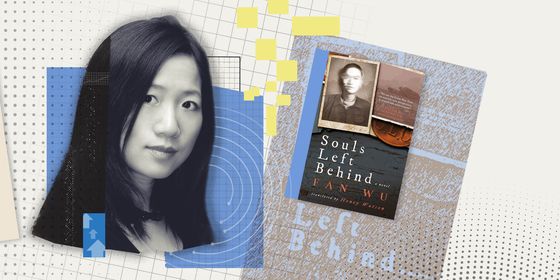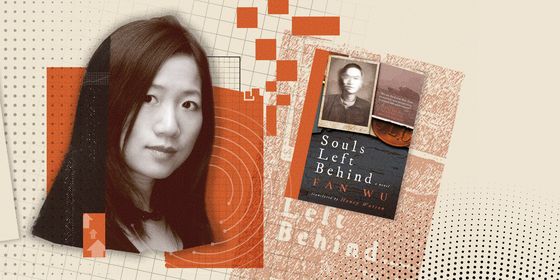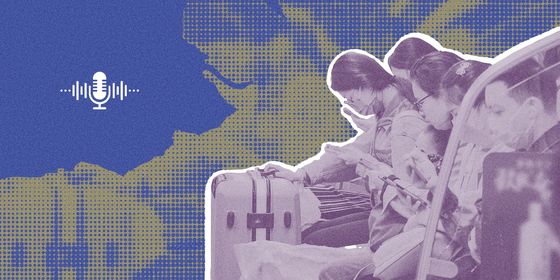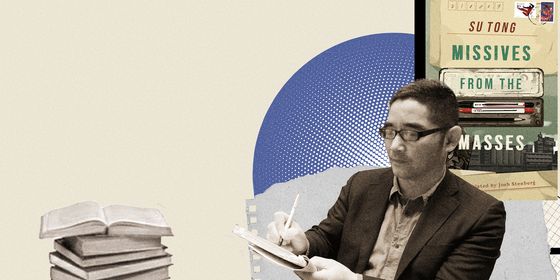Author Han Jinliang’s contribution to the growing body of Chinese Covid literature on pandemic restrictions and collective loss
Mingming saw an incoming call from her mother while she was standing in front of the entrance to a clothing store. The shop was closed. She picked up the call without speaking.
The mannequin in the window was wearing clothes from last season and had a sheet of A4 paper pasted to its bare legs bearing a message in Chinese: “ENTIRE STORE 70% OFF.” The interior of the store was lit and there was another sheet of paper attached to the door, which bore the QR code of the state health check program and a handwritten note, advising, “Occupancy limited to five people at a time. Please maintain social distancing.” But there was nobody inside. Even the manager seemed to have disappeared.
Mingming’s mother was telling her about her grandma’s funeral. There were so many things to do. She didn’t mention the deceased herself. Just the year before, Mingming had bought a pair of UGG boots from this store and mailed them to her grandma. They arrived a few days after her birthday banquet. They were brownish-red suede, lined with fleece, and somehow loose and snug at the same time. “These boots could stand up to some use,” her grandma had said. “I wonder how they made them. They feel soft, but they’ve got some strength to them.” She stuck her hands into them and held them up like she was going to wear them that way.
“That stuff’s all made in China,” Mingming’s aunt’s husband said. “Not worth much. We don’t lack for anything these days, and we’ve got central heating. You won’t need to wear those.”
Mingming’s grandma seemed not to have heard. She asked Mingming when she was coming home. She wanted to know if the store would go out of business. She asked how bad the pandemic was outside of China. She began to cry then, as if she had realized that she was powerless to help her granddaughter and blamed herself for being one of the many that had encouraged her granddaughter to blunder into calamity. Mingming did her best to comfort her grandma through the video screen. She told her grandma that she would make a bet with her about how long the boots would last.
“I bet they last you three years,” Mingming said.
“I’m not going jogging in them,” her grandmother laughed. “I bet they last me ten years, at least.” A year later, her grandma was dead, and the boots were still brand new. “Since nobody wants them, I might as well take them,” her aunt’s husband had said.
Her aunt’s husband had handled the funeral arrangements. His goal was to—as her mother put it—“make sure the family’s dignity was preserved.” Mingming’s father shouted in the background: “He might have preserved it, but he didn’t impress anyone. There was one bottle of baijiu and one bottle of red wine for each table. If you wanted to drink more, you were out of luck.” When Mingming called her mother, her father always demanded her to be put on speakerphone. He never came close to the phone but chose to howl across the distance. He was like the people on the internet that choose to post their insults under a sock puppet account.
The complaints always ended with a cough, a snort, and the forceful expectoration of a loogie. Mingming could picture what came next: her father pinching one nostril after the other shut to blast his nasal cavity clear of snot, as if he could expel the target of his rage. She pictured her father as some swamp-dwelling beast that expressed aggression through its mucus. She hung up before he could complete his ritual.
Mingming’s travel agency was in the same mall as the clothing store. It was near the center, but it had a corner space, with one side facing the escalator and the other side facing the bathrooms, so there was plenty of foot traffic. That was why Feng Zhaoting pushed her to take the space. During those two months they were open, a number of customers had come in because they were waiting for someone to use the washroom. They would come in, start looking at the promotional posters and end up signing up for a package tour. Whenever this happened, Feng Zhaoting would pace around in front of her. His face did not betray any emotion but the muscles in his back twitched spasmodically as if he was about to sprout wings and flap away.
At the time, he wasn’t getting any business himself and he still hadn’t gotten his driver’s license. He wouldn’t achieve much success for a while. But Mingming did her best to take him along with her. He had a few things going for him: He kept his nails clean and trimmed, the lenses of his glasses were always free of fingerprints, there was no dandruff on his collar, his mouth didn’t smell like her father’s mouth, his clothes didn’t smell like her father’s clothes, and even when he acted a bit smug, like after the walk-ins signed up for a tour, it was kind of endearing.
She unlocked the door. Inside the office, there was a faint smell of dust. The dish on the counter still had a few chocolates in it, probably expired or close to it. As she walked across the floor, she heard it creak under her feet. When there were people around, the sound was usually covered up, but it was annoyingly sharp in complete silence.
Mingming sat down and opened the sandwich she had bought at the supermarket. It wasn’t very good, but it was small enough that she was taking her last bite before she realized. Buying necessities was one of the few permissible reasons to go out during the lockdown, so people lingered in the supermarket aisles, inspecting mundane products as if they were pondering a masterwork in a museum. The employees stationed at the door didn’t actually do anything. If you stopped to disinfect your hands or swipe your app, there was no reaction, and charging past them would only inspire a furrowed brow, a shake of the head, or a weak exhortation muffled by a mask. When Mingming first arrived, she told her mother, “Everyone always smiles at each other here.”
“They want you to open your wallet,” her father had grunted. “You international students are nothing but cash cows.”
Liberation Day | Short Story is a story from our issue, “Promised Land.” To read the entire issue, become a subscriber and receive the full magazine.














